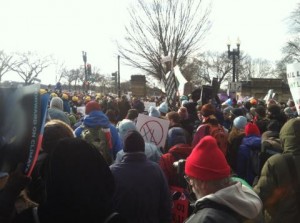
Forward on Climate Rally, Washington D.C. Feb. 2013
According to a recent internet survey conducted by Duke University’s Nicholas Institute 54% of U.S. Americans believe that the climate is changing as a result of human activity. This may not seem like a lot, but it is more than half of the country and it marks a high point of belief not seen since 2007. Thirty eight percent see climate change as a serious threat, that’s approximately 91 million people in the U.S. So why is there not more of a public outcry about the issue of climate change? The lack of action in Washington, D.C. doesn’t come as a big surprise, considering how much money the fossil fuel industry spends on political campaigns and lobbying. According to Oil Change International the amount spent on the 111th Congress (2009 & 2010) was over $347 million. But what about the lack of political action by many citizens?
For those of us already active in the climate movement, our first thought is often that the others not taking action just don’t fully understand the problem. Surely if people were educated about the seriousness of climate change they would join our movement, right? We host movies and other educational events. We host educational talks by scientists in the field giving us all the facts and dire predictions. We have many of these talks in my town, I remember one night there were even two happening at once. The information is out there and it’s not difficult to find for those who want to know more. It’s easy to get overwhelmed with information and ending up feeling a bit depressed by the whole situation. The problem is not lack of information, the problem is a lack of action and tangible solutions.
Usually when a plan is presented it’s about changes we can make at home. Many of us have made at least modest changes to our lifestyles in an effort to consume less. That’s important, but considering what we are up against it’s going to take more than personal changes. There are many reasons people avoid political action. Many lack faith in our political system or they just don’t know where to start. For some it’s just too overwhelming to think about making changes at the national or global level. Some have just lost hope that we can get off of our current fossil fuel trajectory. It’s also difficult to gauge the effects of political action. Things like driving less and improving household energy efficiency can give us instant feedback as soon as we see the savings in our gas budget or electric bill. Activism doesn’t always give us that instant feedback, it takes a certain amount of faith and patience which is a tough sell in a culture of instant gratification. This is a challenge because activism requires a lot of people on board to be most effective.
So as activists we need to find new ways to engage people. We need to move on from just presenting the facts and spend more time presenting a path forward. We need to be realistic about what kind of results to see from political actions, things don’t always happen overnight. We need measurable goals, both short and long term. Instead of giving a doom and gloom scenario of what will happen if nothing is done, perhaps people would respond better to the vision of what is possible if we all act quickly. Helping people find how they can bring their individual skills and talent to the movement is also key. We need to provide opportunities for people to be active in different ways. Some people hate meetings or rallies, but they might really like social networking or other activities they can do from home. Ask people what they feel passionate about and ask them to bring that to the movement. Are they a musician or artist? They can use their art to help get the message out. Do they love kids? They can find ways to engage young people. If being an activist means engaging in activities you find fun and interesting to work towards a goal of a brighter future, perhaps more people will want to join in.

